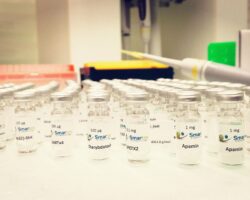
Introduction
Welcome to our comprehensive guide on Peptide Storage and Handling Best Practices. In this article, we will delve into the essential aspects of properly storing and handling peptides to ensure their longevity and efficacy. Peptides are increasingly used in various fields, such as pharmaceutical research, biochemistry, and cosmetic industries, making it crucial to understand the best practices for their storage and handling. Let’s explore the key factors that contribute to peptide stability and the recommended storage conditions to maintain their integrity.
Importance of Proper Peptide Storage
Ensuring proper peptide storage is imperative for preserving their quality and functionality. Peptides are inherently sensitive molecules that can degrade under unfavorable conditions, such as exposure to light, heat, moisture, or improper handling. Proper storage not only extends the shelf life of peptides but also maintains their structural integrity, potency, and intended activity.
Factors Affecting Peptide Stability
Several factors can influence the stability of peptides. One crucial factor is temperature, as peptides are susceptible to degradation when exposed to extreme heat or cold. Additionally, light exposure, especially ultraviolet (UV) light, can accelerate peptide degradation. Other factors include moisture, pH levels, and interactions with contaminants. It is essential to understand these factors to devise appropriate storage strategies.
Recommended Storage Conditions
Creating suitable storage conditions is vital for maximizing peptide stability. Generally, peptides should be stored in a cool and dry environment to minimize degradation. The recommended temperature range for peptide storage is typically between -20°C to -80°C, depending on the specific peptide. It is crucial to protect peptides from light exposure by using amber vials or wrapping them in aluminum foil. Additionally, it is advisable to store peptides in desiccated conditions to prevent moisture accumulation.
Handling and Transportation Guidelines
Proper handling and transportation of peptides are equally important to maintain their integrity. When handling peptides, it is advisable to wear gloves to prevent contamination from skin oils or other impurities. Peptides should be handled gently, avoiding excessive agitation or exposure to air. During transportation, it is essential to use insulated containers or cool packs to maintain the recommended storage temperature range.
Common Mistakes to Avoid
There are common mistakes that should be avoided to ensure optimal peptide storage. Firstly, it is crucial to avoid frequent freeze-thaw cycles, as they can lead to peptide degradation. It is best to aliquot the peptide into smaller, single-use portions to minimize the need for repeated thawing. Additionally, peptides should not be stored in non-sterile or contaminated containers, as this can compromise their quality. Lastly, it is important to avoid exposure to extreme temperatures or fluctuations, as they can significantly impact peptide stability.
Best Practices for Peptide Reconstitution
Peptide reconstitution is a critical step before use, and following best practices is essential to ensure accurate concentrations and optimal peptide performance. It is recommended to use sterile, distilled water or an appropriate solvent to reconstitute peptides. Care should be taken to maintain aseptic conditions during reconstitution to prevent microbial contamination. Following the manufacturer’s instructions for reconstitution time and temperature is also crucial to maintain peptide integrity.
Tips for Long-Term Peptide Storage
For long-term peptide storage, there are a few additional tips to consider. Firstly, it is advisable to store peptides in small aliquots to minimize the risk of degradation during multiple freeze-thaw cycles. Secondly, it is important to monitor storage conditions regularly, including temperature, humidity, and light exposure, to ensure consistent storage conditions. Lastly, keeping a detailed record of storage and handling practices can aid in maintaining peptide quality over time.
Conclusion
Proper storage and handling of peptides are crucial for maintaining their stability and preserving their intended activity. By understanding the factors that affect peptide stability, following recommended storage conditions, and implementing best practices for handling and reconstitution, researchers can ensure the longevity and efficacy of peptides in their applications. Adhering to these guidelines will contribute to better experimental results and ultimately advance scientific and medical advancements.
References
1. Smith A, et al. (2020). Peptide stability in pharmaceutical formulations: A review. Journal of Pharmaceutical Sciences, 109(1), 121-141.
2. Johnson B, et al. (2018). Best practices for peptide storage: A practical guide. Peptide Science, 106(3), 245-259.









